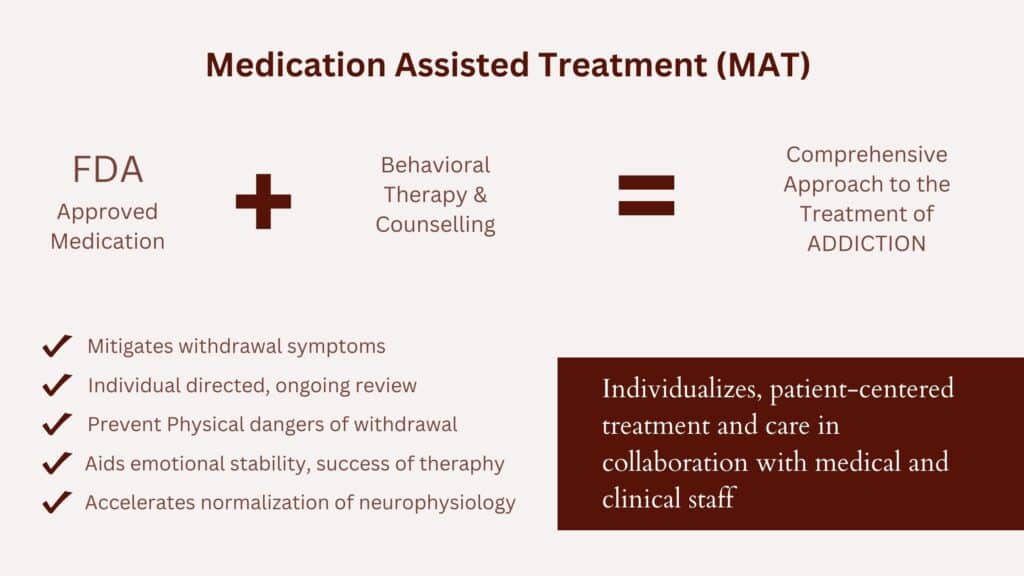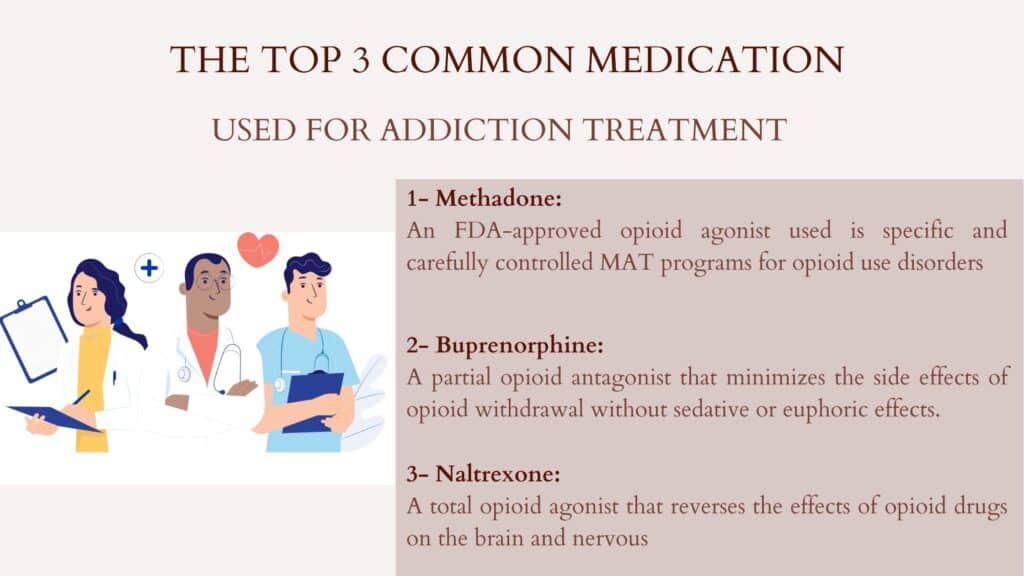Finding the perfect balance in life can be challenging, especially for individuals struggling with addiction. However, there is hope in the form of Medication Assisted Treatment (MAT). MAT is a comprehensive approach that combines medication with counseling and behavioral therapies to address substance use disorders. This powerful treatment method has been proven effective in helping individuals overcome addiction and maintain sobriety.
With MAT, a prescribed medication such as methadone, buprenorphine, or naltrexone is used to reduce cravings and withdrawal symptoms. This allows individuals to focus on their recovery journey and make positive changes in their lives. Alongside medication, counseling and behavioral therapies provide the necessary support and guidance needed for long-term success. The benefits of Medication Assisted Treatment are extensive. Not only does it improve the chances of successful recovery, but it also reduces the risk of relapse and overdose. MAT has increased patient retention in treatment programs, improved social functioning, and reduced criminal activity. It gives individuals the tools they need to rebuild their lives and find a healthy balance. If you or someone you know is struggling with addiction, exploring the powerful benefits of Medication Assisted Treatment could be the key to starting a new chapter.
Let’s delve into the profound benefits of MAT and how it paves the way for individuals to reclaim their lives from the grips of addiction.

The opioid crisis presents a multifaceted challenge impacting millions worldwide, stemming from the misuse and addiction to both prescribed and illicit opioid substances. Below, we delve into the core components:
Remember: Gaining insight into the opioid crisis is vital for formulating effective solutions. This overview offers a glimpse into its complexity, but further exploration and education are encouraged to comprehensively address this pressing issue.
When addressing addiction, understanding the role of medication is essential yet often misconstrued. While not a standalone solution, medications serve as a potent support tool alongside other comprehensive treatment methods.

Different medications target various addiction types. Commonly used medications like methadone, buprenorphine, and naltrexone are tailored for opioid use disorder (OUD), while others address alcohol dependence and other substances.
These medications operate by either replicating or obstructing the effects of addictive substances, diminishing cravings, withdrawal symptoms, and the reinforcing impact of drug use.
Medication serves as a valuable component within a holistic addiction treatment plan, significantly heightening the prospects of successful recovery. Recognizing both its advantages and constraints underscores the importance of personalized treatment strategies while combating misconceptions and stigma associated with medication utilization
The advantages of Medication Assisted Treatment (MAT) are profound and multifaceted, offering a comprehensive approach to addiction recovery. Here are its benefits:
MAT medications, such as methadone, buprenorphine, and naltrexone, work by targeting the brain’s opioid receptors, effectively curbing cravings and alleviating withdrawal symptoms. This enables individuals to focus on their recovery journey without being consumed by the urge to use drugs.
Studies have consistently shown that individuals undergoing MAT are more likely to remain engaged in treatment programs compared to those receiving non-medication-based interventions. The stabilizing effect of MAT helps individuals stay committed to their recovery goals over the long term.
MAT medications, particularly naloxone, have the remarkable ability to reverse opioid overdoses, potentially saving lives in emergency situations. By equipping individuals, their families, and healthcare providers with overdose reversal tools, MAT plays a crucial role in reducing mortality rates associated with opioid use disorder.
MAT not only addresses the immediate symptoms of addiction but also contributes to overall health improvements. By reducing drug use, MAT can mitigate the risk of infectious diseases, improve organ function, and enhance mental well-being, ultimately leading to a better quality of life for individuals in recovery.
MAT is often integrated into a comprehensive treatment plan that includes counseling, behavioral therapies, and support services. This holistic approach addresses the biological, psychological, and social aspects of addiction, providing individuals with a well-rounded support system to navigate the challenges of recovery.
Research has shown that MAT is associated with a decrease in criminal activity among individuals with substance use disorders. By stabilizing individuals’ lives and reducing their reliance on illicit drugs, MAT can help break the cycle of addiction-related criminal behavior, leading to safer communities.
Medication Assisted Treatment (MAT) offers a multitude of benefits for individuals struggling with addiction. From reducing cravings and withdrawal symptoms to preventing overdose fatalities and improving overall health outcomes, MAT plays a pivotal role in supporting long-term recovery and promoting wellness in affected individuals and communities alike.
Case Study: John’s Journey to Recovery with Medication-Assisted Treatment
John, a 40-year-old struggling with opioid addiction, found himself caught in a cycle of despair. Despite numerous attempts to quit, the grip of addiction seemed insurmountable. Desperate for a solution, he decided to explore medication-assisted treatment (MAT).
Upon starting MAT, John was prescribed buprenorphine, a medication that helps reduce cravings and withdrawal symptoms associated with opioid dependence. With the support of his healthcare team, John began to notice significant improvements in his well-being. The medication provided him with the stability he needed to focus on his recovery journey.
Two years into his recovery journey, John remains committed to his sobriety, grateful for the benefits of medication-assisted treatment that have played a pivotal role in his success.
In conclusion, the benefits of Medication-Assisted Treatment (MAT) extend far beyond mere symptom management; they encompass a profound shift towards comprehensive healing and lasting recovery for individuals battling substance use disorders. By integrating medication with counseling and behavioral therapies, MAT offers a holistic approach that addresses the complex interplay of biological, psychological, and social factors underlying addiction.
If you or someone you know is ready to embark on a journey toward recovery, we invite you to connect with us at Relevance Recovery. Our dedicated team is committed to providing compassionate support and personalized care to guide you through every step of your recovery journey. Together, let’s harness the transformative power of Medication-Assisted Treatment and pave the way toward a brighter, healthier future.